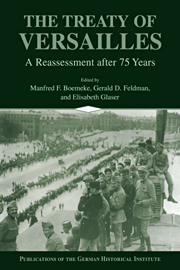Book contents
- Frontmatter
- Introduction
- Prologue: 1919-1945-1989
- PART ONE PEACE PLANNING AND THE ACTUALITIES OF THE ARMISTICE
- PART TWO THE PEACEMAKERS AND THEIR HOME FRONTS
- PART THREE THE RECONSTRUCTION OF EUROPE AND THE SETTLEMENT OF ACCOUNTS
- PART FOUR THE LEGACY AND CONSEQUENCES OF VERSAILLES
- 18 The Soviet Union and Versailles
- 19 Versailles and International Diplomacy
- 20 The League of Nations: Toward a New Appreciation of Its History
- 21 A Comment
- PART FIVE ANTECEDENTS AND AFTERMATHS REFLECTIONS ON THE WAR-GUILT QUESTION AND THE SETTLEMENT
- Bibliography
- Index
19 - Versailles and International Diplomacy
from PART FOUR - THE LEGACY AND CONSEQUENCES OF VERSAILLES
Published online by Cambridge University Press: 05 January 2013
- Frontmatter
- Introduction
- Prologue: 1919-1945-1989
- PART ONE PEACE PLANNING AND THE ACTUALITIES OF THE ARMISTICE
- PART TWO THE PEACEMAKERS AND THEIR HOME FRONTS
- PART THREE THE RECONSTRUCTION OF EUROPE AND THE SETTLEMENT OF ACCOUNTS
- PART FOUR THE LEGACY AND CONSEQUENCES OF VERSAILLES
- 18 The Soviet Union and Versailles
- 19 Versailles and International Diplomacy
- 20 The League of Nations: Toward a New Appreciation of Its History
- 21 A Comment
- PART FIVE ANTECEDENTS AND AFTERMATHS REFLECTIONS ON THE WAR-GUILT QUESTION AND THE SETTLEMENT
- Bibliography
- Index
Summary
Shortly after receiving an invitation from the German Historical Institute to attend the stimulating meeting that later transpired in Berkeley in the spring of 1994, I happened to be lecturing on the Paris Peace Conference in my undergraduate course on the history of international relations. After the class, a student sauntered into my office and put to me a question that coincidentally pertained directly to the subject of the essay for that meeting that I was just beginning to compose in my mind: Had Woodrow Wilson been able to withstand the pressures from what the student called the “vindictive” European statesmen in 1919 to impose what he characterized as a “Carthaginian” peace on defeated Germany, did I not think that the world would have been spared the agony of the Great Depression, the rise of Nazism, World War II, and the Holocaust?
As is my custom, I replied with a question of my own. Where had he learned the term “Carthaginian”? To my surprise he reeled off a thoroughly competent summary of the peace settlement after the Third Punic War. (It turned out that he had taken a survey course in ancient history.) But when I probed his knowledge of the more recent, metaphorical connotation of the word, the conversation took a distinctly more nebulous turn. Had he read Keynes? No. Ray Stannard Baker? Who? In the end it proved impossible to identify the specific source of this evocative adjective that had somehow found its way into the young man's mind. He had simply picked it up somewhere in the general historiographical literature. It somehow seemed to be the natural modifier for the noun “peace” with reference to the Treaty of Versailles.
- Type
- Chapter
- Information
- The Treaty of VersaillesA Reassessment after 75 Years, pp. 469 - 506Publisher: Cambridge University PressPrint publication year: 1998
- 35
- Cited by



